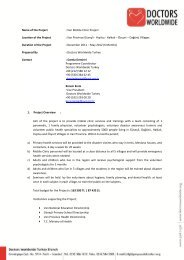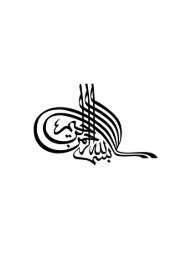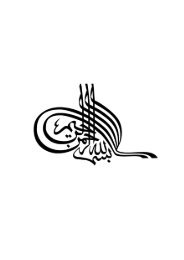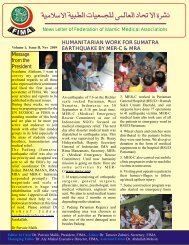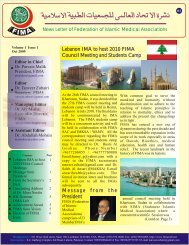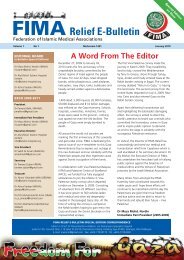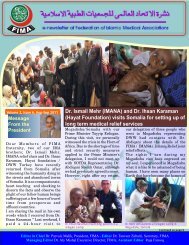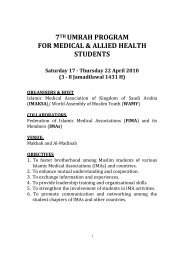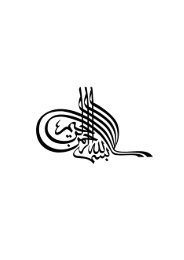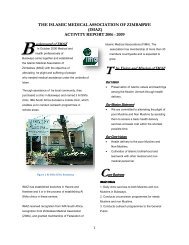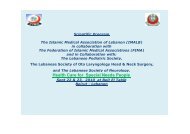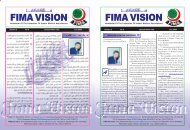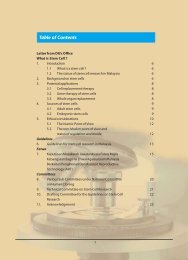FIMA Year Book 2009 - Federation of Islamic Medical Associations
FIMA Year Book 2009 - Federation of Islamic Medical Associations
FIMA Year Book 2009 - Federation of Islamic Medical Associations
Create successful ePaper yourself
Turn your PDF publications into a flip-book with our unique Google optimized e-Paper software.
Problem Based Learningsystem for an aspiring physicianstarting from elementary to postgraduate levels including describingattributes <strong>of</strong> a physician, his rightsand obligations. Deep study <strong>of</strong>medicine with reflection shows thephysician the majesty <strong>of</strong> the Creatorand this deepens and strengthensiman (Jalabi 1974, Jalabi 1978,Kasule 1980). A believing physicianwill be more ethical in his researchand practice. Ethics involves: makingsure the physician has the appropriatelevel <strong>of</strong> knowledge and skill, chargingreasonable fees for services, etiquettewith patients especially <strong>of</strong> the oppositegender, treating patients after theirconsent. There have been severalattempts to define medical ethics fora Muslim physician, ancient andmodern. Al Tabari described the<strong>Islamic</strong> code <strong>of</strong> medical ethics in 970AD to include the following: personalcharacteristics <strong>of</strong> the physicianobligations towards patients,obligations towards the community,obligations towards colleagues, andobligations to his assistants. The<strong>Islamic</strong> <strong>Medical</strong> Association <strong>of</strong>the US and Canada (presently the<strong>Islamic</strong> <strong>Medical</strong> Association <strong>of</strong>North America -IMANA) adoptedthe Oath <strong>of</strong> a Muslim Physicianin 1977 as an alternative to theHippocratic oath. The <strong>Islamic</strong> Code<strong>of</strong> <strong>Medical</strong> Ethics was issued by the<strong>Islamic</strong> Organization for <strong>Medical</strong>Sciences, Kuwait 1981. Amine andEl Kadi (Athar, 1993) based medicalethics on the Qur’an “the physicianmust believe in God, and in the<strong>Islamic</strong> teachings and practice it inprivate and public life; be gratefulto his parents, teachers, and elders;be humble, modest, kind, merciful,patient, and tolerant; follow the path<strong>of</strong> the righteous; and always seekGod’s support. The Muslim physicianmust stay abreast <strong>of</strong> current medicalknowledge, continuously improve hisskills, seek help whenever needed,and comply with legal requirementsgoverning his pr<strong>of</strong>ession; realize thatGod is the maker and owner <strong>of</strong> hispatient’s body and mind and treathim within the framework <strong>of</strong> God’steachings; realize that life was given toman by God, that human life starts atthe time <strong>of</strong> conception, and that humanlife cannot be taken away except byGod or with His permission; realizethat God is watching and monitoringevery thought and deed; follow God’sguidelines as his only criteria, even ifthey differ with popular demand orthe patient’s wishes; not recommendnor administer any harmful material;render needed help regardless <strong>of</strong>financial ability or ethnic origin <strong>of</strong>the patient; <strong>of</strong>fer needed advice withconsideration for both the patient’sbody and mind; protect the patient’sconfidentiality; adopt an appropriatemanner <strong>of</strong> communication; examinea patient <strong>of</strong> the opposite sex in thepresence ot a third person wheneverfeasible; not criticize anotherphysician in the presence <strong>of</strong> patientsor health personnel, refuse paymentfor treatment <strong>of</strong> another physician or<strong>FIMA</strong> <strong>Year</strong><strong>Book</strong> <strong>2009</strong>52




